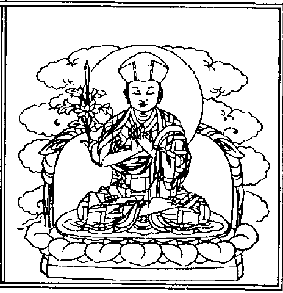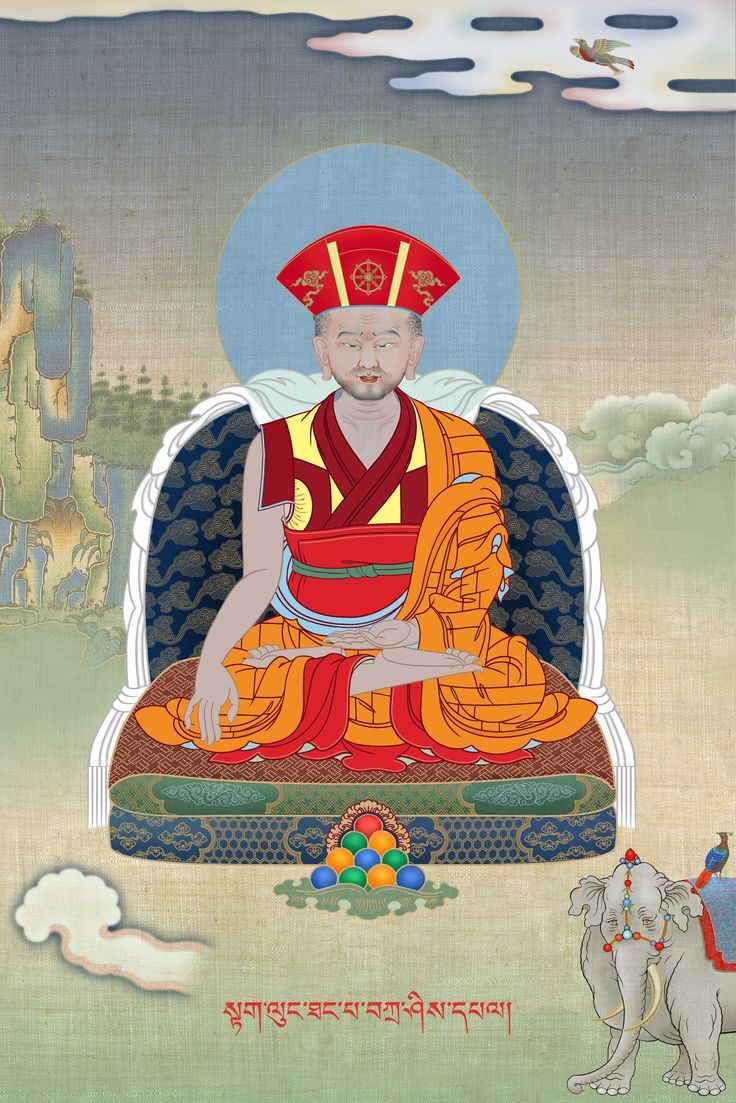Taklung Thangpa Tashi Pal
སྟག་ལུང་ཐང་པ་བཀྲ་ཤིས་དཔལ།
stag lung thang pa bkra shis dpal
Small Biography
Taklung Thangpa Tashi Pal (1142-1210) was one the eight foremost disciples of Phagmo Drupa, as well as the founder of the Taglung Kagyu school.
Taklung Thangpa Tashi Pal (Founder of the Taklung Kagyu Lineage)
The Taklung Kagyu lineage remains unbroken to this day, since it's founding by the Great Lord Taklung Thangpa Tashi Pal (1142-1210), who also founded the Taklung Yarthang Monastery.
He was the unequalled Lord of Dharma, and was the protector of sentient beings of the entire three world systems, and the embodiment of the enlightened body, speech, mind, quality, and activity of all the Buddhas of the three times and ten directions. Having achieved perfection in devotion and respect towards his root teacher and his teachings, Tashi Pal is considered as one of the many immediate students of the great Lord of Dharma, Pal Phagmo Drubpa, the protector of beings.
With many auspicious signs, Tashi Pal was born in the Water Dog Royal Tibetan Year, 1142 AD, to the Taklung Gazi family, one of the six main ancestral Tibetan lineages. He embraced monkhood in Pal Thang-kya Monastery, where he studied and mastered the general and distinct Buddhist teachings. Owing to his vast and profound knowledge of Buddhist doctrine, he was renowned as the great sovereign and accomplished master scholar.
He gradually travelled towards Central Tibet where he met his destined root teacher, Phagmo Drubpa. Phagmo Drubpa said to him, "Now that you have newly arrived, you should put these new robes on your new body, and you will be absorbed into my heart. Also, if I am in Bodh Gaya, then you must follow after me." For six years, Tashi Pal served his master as his personal attendant during which time he received the entire teachings of Sutra and Tantra that includes the ripening empowerment and liberating instructions of the great Mahamudra and the six yogic teachings of Naropa. Later, he spent many years in six different solitary places staying in extremely strict retreat practice by sealing off his retreat room. As a result, he achieved the supreme siddhi of enlightenment.
He later constructed temples at the monastic seat of his master, Phagmo Drubpa. In the year 1180 AD, he established the seat and the distinct tradition of Taklung Kagyu at Taklung Thang Dorje Den, the sacred place which was prophesied by Lord Buddha himself. Since then, his name came to be known as Taklung Thangpa and his distinct tradition renowned as the unequalled lineage of accomplishment, the Taklung Kagyu. The main teaching of Taklung Kagyu is Guru Yoga and the main practice devotion and reverence towards one's root teacher.
Specifically Vinaya practice was greatly emphasized. As such, Taklung Thangpa Tashi Pal, the fully ordained monk who held the Vajrayana doctrine, came to be famously known for his pure morality that made meaningful the life of everyone who met him, heard of him or remembered him. He devoted the first half of every month to bless and teach students, and the second half to strict retreat practice. Generally, there were more than three thousand six hundred resident monks in Taklung Monastery during his time, and his disciples came from different places in India, China, Mongolia, and the three provinces of Tibet. Thus, his spiritual activities reached far and wide.
Many renowned scholars and accomplished masters who preserved and disseminated the essential teachings of the Taklung Kagyu came after him. Not only did they benefit the general doctrine of Shakyamuni Buddha but also the distinct tradition of the Taklung Kagyu. In this way, the Taklung Kagyu School flourished throughout Tibet and its neighboring countries.
After giving final advice to his followers, Taklung Thangpa achieved the non-dual state of Vajradhara and passed away into nirvana, dissolving his body and mind into the Dharmakaya in the year 1210, the Iron Horse Year, in the 4th Rabjung Cycle. This was displayed to allow beings to realize the impermanent nature of life.

